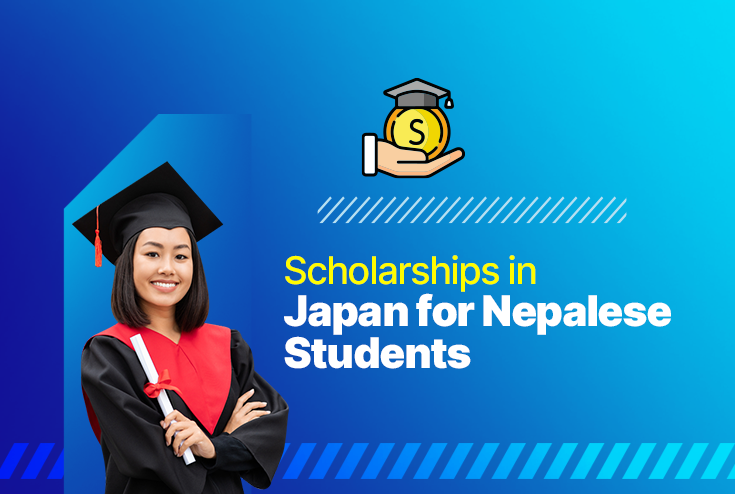.png)

Japan is one of the most advanced and safest countries in the world, offering high-quality education, cutting-edge research facilities, and diverse scholarship opportunities for international students. For Nepali students, Japan represents a land of opportunity, not just for academics, but also for cultural exchange, technology, and career advancement.
To make this experience more financially achievable, this comprehensive blog will guide you through the top scholarships available in Japan for Nepali students, eligibility requirements, application procedures, and tips to increase your chances of success in 2025.
Table of Contents
Choosing Japan as your study destination offers a unique combination of academic excellence, cultural richness, and professional opportunity. Here’s a deeper look at why Japan is becoming increasingly popular among Nepali students:
Japan is home to some of the world’s top-ranked universities, such as:
These institutions are globally respected for their research, especially in engineering, science, robotics, information technology, and health sciences. Japan also ranks among the top 10 countries for innovation in education.
Japan offers a wide range of fully-funded and partially-funded scholarships for international students. Programs like MEXT, JASSO, and university-specific scholarships can cover tuition fees, monthly living expenses, and even round-trip airfare. This financial support significantly reduces the cost burden for students from countries like Nepal.
Graduating from a Japanese university opens the door to:
Many Nepali students find employment in Japan after graduation and receive work visa extensions of up to 5 years.
Many Japanese universities now offer programs fully in English, especially at the graduate level. You can study engineering, IT, business, and even liberal arts without needing to master the Japanese language beforehand (although learning Japanese is still highly recommended for daily life and part-time work).
Japan is consistently ranked as one of the safest countries in the world, with:
This provides a peaceful and supportive environment for international students to focus on their studies.
Thousands of Nepali students are currently studying in Japan. There are active Nepali student associations in major cities like Tokyo, Osaka, and Fukuoka that help newcomers with:
You’ll feel at home even while you’re away.
Japan offers a wide array of scholarships for international students, many of which are open to Nepali applicants. These scholarships come from the Japanese government, universities, private organizations, and local prefectures. Each scholarship differs in eligibility, benefits, and application process, so understanding the categories is essential.
The MEXT Scholarship is the flagship scholarship program offered by the Japanese government through its Ministry of Education, Culture, Sports, Science and Technology (MEXT).
|
Categories |
Who Can Apply |
Duration |
Purpose |
|---|---|---|---|
|
Undergraduate Students |
High School graduates |
5 years |
Bachelor’s degree |
|
Research Students |
Bachelor’s or Master’s graduates |
2-3 years |
Master’s/PhD/Non-degree research |
|
Specialized Training College |
High School graduates |
2-3 years |
Vocational training (IT, business, design, etc.) |
|
Teacher Training |
In-service teachers |
1.5 years |
Education and research skills |
Key Benefits:
Application Methods:
Timeline:
Learn more: Embassy of Japan in Nepal – MEXT Details
JASSO is a government body that supports international students with academic and financial assistance.
Main Program:
Eligibility:
Benefits:
Duration:
How to Apply:
Learn More: JASSO Scholarships
Many Japanese universities offer internal scholarships funded by their endowments or government support. These scholarships vary by field of study, academic performance, nationality, and financial condition.
Examples:
|
University |
Scholarship Name |
Coverage |
Highlights |
|---|---|---|---|
|
University of Tokyo |
International Student Scholarship |
¥120,000/month |
Based on academic merit, research potential |
|
Ritsumeikan Asia Pacific University (APU) |
Tuition Reduction Scholarship |
30% to 100% tuition |
Automatic consideration during admission |
|
Kyoto University of Advanced Science (KUAS) |
Super KUAS-E Scholarship |
Full tuition + ¥1,200,000/year stipend |
For Engineering students |
|
Tohoku University |
President Fellowship |
Full tuition waiver + ¥100,000/month stipend |
Competitive postgraduate program |
|
Nagoya University |
G30 Scholarship |
Partial or full tuition |
For English-medium programs |
Common Features:
Application:
Numerous private foundations in Japan offer scholarships to international students. Though competitive, they offer excellent support and sometimes require community service, research contributions, or participation in cultural events.
Notable Private Scholarships:
|
Foundation |
Monthly Stipend |
Application Period |
Requirements |
|---|---|---|---|
|
¥100,000–¥140,000 |
Sept–Oct |
Must be in Japan or accepted into a university |
|
|
¥150,000–¥200,000 |
April & Sept |
Research students only, future vision required |
|
|
¥120,000 |
Jan–Feb |
Southeast Asian students, including Nepalis |
General Requirements:
Several prefectures and cities in Japan offer scholarships to attract international students to their local universities and technical colleges.
Examples:
These scholarships often provide:
Best For:
To apply for scholarships in Japan, students generally need:
All documents should be in English or Japanese (translated and notarized).
1. Identify Suitable Scholarships
Explore various scholarship options like MEXT, JASSO, university-specific scholarships, or those from private foundations. Carefully check eligibility criteria, application deadlines, and required documents for each.
2. Select the Course and University
Choose a course that matches your academic interests and goals. Make sure the university accepts international students under the scholarship you are applying for. Visit the university’s official website to confirm.
3. Prepare Necessary Documents
Gather important documents such as: Academic transcripts and certificates, Statement of Purpose / Research Plan, Language test scores (IELTS/TOEFL or JLPT), Recommendation letters, Passport and ID documents. Ensure everything is clear, accurate, and complete.
4. Submit Application through Proper Channels
Depending on the scholarship type, submit your application via:
5. Attend Written Tests or Interviews (if required)
Some scholarships, especially MEXT, require written exams and interviews. Be prepared to discuss your academic goals, research interests, and motivation to study in Japan.
6. Receive Letter of Acceptance and Scholarship Confirmation
If selected, you will receive an official Letter of Acceptance from the university and a scholarship confirmation letter. Follow any further steps, such as visa application and travel arrangements.
1. Start early preparation (at least 1 year before intake)
Begin planning your scholarship journey well in advance. This gives you enough time to research programs, prepare documents, learn Japanese or English (if required), and meet all deadlines without pressure.
2. Prepare a compelling SOP/research plan
Your Statement of Purpose (SOP) or research proposal is crucial. Clearly explain your academic goals, why you chose Japan, and how the program fits your career. A strong, focused plan makes you stand out to selectors.
3. Take language tests in advance
Most scholarships require English proficiency (TOEFL/IELTS) or Japanese (JLPT), depending on the medium of instruction. Taking these tests early ensures you have your scores ready and can retake them if needed for a better result.
4. Research multiple scholarship routes—don’t depend on one
Don’t limit yourself to just one scholarship. Explore options like MEXT, JASSO, university-specific scholarships, Rotary Yoneyama, and other private/NGO-funded opportunities to increase your chances.
5. Stay updated with Embassy announcements and university notices
Regularly check the Japanese Embassy in Nepal and your target university websites. They post scholarship announcements, deadlines, and application changes that you don’t want to miss.
Studying in Japan can be life-changing, especially if you secure a scholarship. The competition may be tough, but with the right preparation and expert guidance from Asahi, your dream is absolutely achievable. Contact Us Now !
As a leading education consultancy in Nepal for Japan student visa, we provide:
1. Can I apply for a Japanese scholarship without Japanese language skills?
Yes you can apply. Many programs are taught in English. However, basic Japanese is helpful for daily life and to get part-time jobs.
2. What GPA is required for a scholarship in Japan?
The scholarship opportunities in Japan from Nepal are highly competitive. To qualify for the scholarships, the applicant must have secured 75% marks (CGPA 3.5) for Natural Sciences and 65% (CGPA 2.9) for Humanities and Social Sciences on average in SEE and plus two exams.
3. Can I study in Japan without a scholarship?
Yes you can. But, it is highly recommended to be aware regarding the costs involved for the degree in Japan. For detailed information regarding the costs you can refer to this blog: Cost to study in Japan from Nepal: A Guide in 2025
4. How can I get a full scholarship in Japan?
Apply for scholarships like MEXT, JASSO, or university-specific awards by meeting academic, language, and application requirements. Early preparation and a strong academic record improve your chances to get a full scholarship in Japan.
5. What is the 100% scholarship in Japan?
The MEXT (Monbukagakusho) Scholarship is a 100% government-funded program that covers tuition, living expenses, and airfare for international students.
6. Can I study in Japan for free?
Yes, through fully funded scholarships like MEXT or some university-specific scholarships, you can study in Japan without paying tuition or living costs.
7. Is it hard to get the MEXT scholarship?
Yes, it’s competitive. Selection is based on academic excellence, a strong study plan, and performance in written tests and interviews. Preparation and clarity of purpose are key.
Also Read:
Study in Japan from Nepal: Complete Guide 2025
Cost to study in Japan from Nepal: A Guide in 2025
Best Consultancy in Nepal for Japan: Your Complete Guide for 2025

Have you ever considered studying where East meets West, where ancient traditions blend seamlessly w...
Read More
Thinking about studying in Japan and wondering how much you can actually earn while pursuing your de...
Read More
Have you ever dreamed of studying fashion in a country where ancient traditions meet cutting-edge st...
Read More
Japan has emerged as one of the most sought-after destinations for Nepali students pursuing agricult...
Read More

Begin a transforming journey with Asahi and
Take off with
passion and self-assurance.
ⓒCopyright 2025 Asahi . All rights reserved | Powered By:Communicate